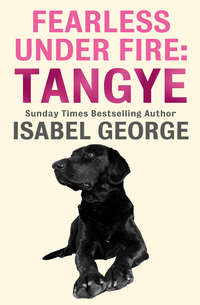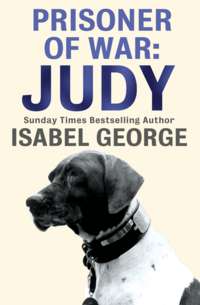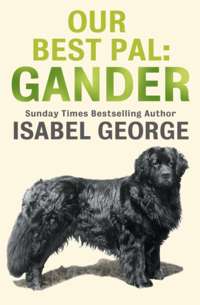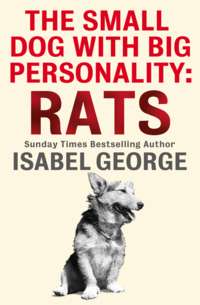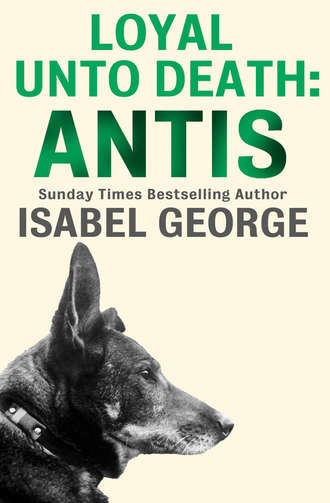
Полная версия
Loyal Unto Death: Antis

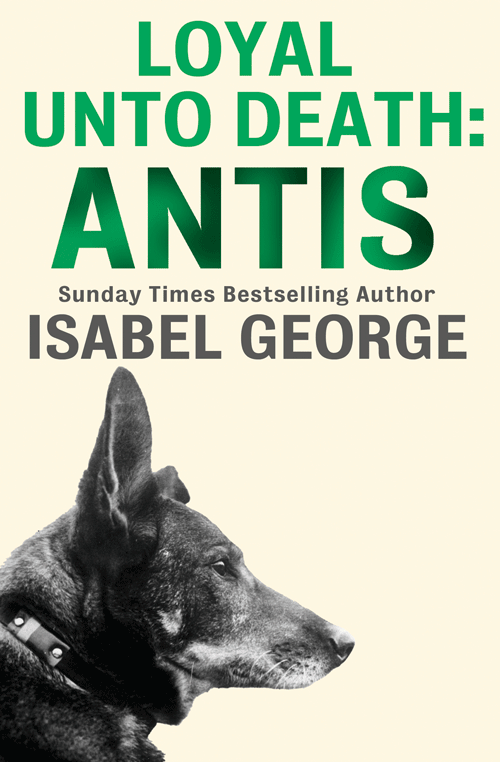
Loyal Unto Death
Antis
A Short Tale from BEYOND THE CALL OF DUTY
Heart-warming stories of canine devotion and bravery
by Isabel George

Dedication
To my parents who showed, by example, that courage, loyalty and love really can conquer all
Epigraph
‘There is an old belief
That on some solemn shore Beyond the sphere of grief Dear friends shall meet once more.’
(Inscription on the grave of Antis at the PDSA Animal Cemetery in Ilford, North London, by John Gibson Lockheart)
Contents
Cover
Title Page
Dedication
Epigraph
Chapter 1: Antis – Loyal Unto Death
Afterword
Bibliography
About the Author
Copyright
About the Publisher
Chapter 1
Antis –
Loyal Unto Death
As friendships go, there are few that could rival the mutual devotion of Czechoslovak pilot Václav Robert Bozděch and his dog, Antis. It was a relationship born out of war, strengthened as a consequence of war and one that came to rest in peace beyond war. The Alsatian had spent eleven of his fourteen years on Air Force bases in France and Britain and if a dog is capable of storing memories he would have recalled the happy days he spent with No. 311 (Czechoslovak) Squadron and how he saved Bozděch’s life a thousand times over in so many ways.
Born in Bohemia in 1912, Bozděch had a happy, though poor, childhood. He excelled at every level of his schooling and went on to perform well at technical college. Here he was heavily influenced by the Czechoslovak emphasis on physical fitness. An eager and dedicated student, Bozděch selected athletics and handball as the sports he would excel in and in his spare time, to satisfy his love of music, he learnt to play the accordion. By the time he graduated in 1929, he was a well-rounded young man with many prospects and a bright future. His technology-based course had given him all he needed to begin working as a locksmith but the obvious limitations of the job soon began to frustrate this intelligent young man and he was relieved when his call-up papers arrived for his two years’ compulsory military service. All young Czechoslovak men considered it an honour to serve their country in this way and the timing was perfect for Bozděch. For him, the time away from normal routine was an opportunity to reassess his future. He had never considered a career in the military but now he could see how his technical know-how could be advanced in this environment. The experience also came at a time when he was becoming more aware of his country’s politics and the fragility of Czechoslovakia’s independence in Europe. The way he saw it, if his country was destined to be an innocent pawn in a political power struggle between France, Britain and Germany then there was probably only one way he could defend and serve his country and that was in uniform.
Two years’ compulsory service gave him an opportunity to test the military waters. Following basic training, Bozděch decided to put his technological knowledge to good use and became a mechanic in the Air Force. Two years later, after demobilizing, he went to work for the car manufacturer Skoda but thoughts of his time in the Air Force stayed with him. In October 1937, unable to ignore these thoughts any longer, Bozděch rejoined the Service and trained as an air gunner.
Adolf Hitler had made no secret of his desire to occupy Czechoslovakia and the same year Bozděch joined the Air Force, Germany’s leader prepared to invade his homeland. Although Hitler had assured the Czechoslovak people that he would protect the German-speaking regions of Bohemia and Moravia, President Beneš was not convinced his country would survive the might of the Third Reich. As an insurance policy he had built up the Czechoslovak Air Force and looked to his allies for reassurance that they would stand shoulder to shoulder against the German threat. Czechoslovakia’s primary protection was her pact with France but there seemed little confirmation that the terms of their agreement would be upheld if the threat of invasion became a reality. And how would Britain react if France went to war with Germany?
The threat to Czechoslovak freedom had become universally apparent. In an attempt to resolve this territorial tug of war, a meeting was arranged between Italy, Britain and France and Adolf Hitler’s Germany. Munich was selected as the venue to reach a settlement. Ironically, Czechoslovakia was informed it would not be required to attend. On hearing the news, the Czechoslovak Minister, Dr Jan Masaryk, commented to British Prime Minister Neville Chamberlain, ‘If you have sacrificed my nation to preserve the peace of the world, I will be the first to applaud you. But if not, gentlemen, God help your souls.’
The Munich agreement failed. Czechoslovakia was alone. On 1 October 1938, German troops entered the Sudetan area, commandeering over 1,600 Czechoslovak Air Force planes and sending the country’s army into withdrawal. By 13 March 1939, Hitler was threatening to bomb Prague unless his Third Reich was allowed to take over Bohemia and Moravia as Protectorate. By 15 March, as the snow fell in the early morning, a convoy of German armoured vehicles snaked through these long-defended communities and by evening Hitler was in Prague. President Beneš had already left for Europe with a plan to set up a democratic government in exile. Even though Germany had jackbooted all over the democracy he had cultivated over the previous twenty years, the defiant President would not accept that it was over.
For Bozděch, it was time to leave his homeland and, with his typical dignity, strength and belief in truth, secure a plan to win it back. Alongside thousands of other army and air force personnel, Bozděch began to plan his escape route. So far, the West had failed to show itself to be a trustworthy ally. The allegiance was there on paper but France and Britain had failed to come through for the Czechoslovak people when they needed it most and Germany had them backed against the wall. Action was required but it was not provided. But who else was going to be in a position of strength and capable of stopping Hitler in his tracks? Only Western democracy was in a position to do that and had any chance of achieving success. Now it was just a matter of being in the right place should war be declared on Germany, which to many people war looked inevitable.
Bozděch, like many others, chose Poland as his destination and plotted a journey through northern Moravia and on to Ostrava. His home in Bohemia would be the start of his 300-mile trek on foot and he planned to set out once the harsh winter had passed. He applied for leave, rather than just disappearing which would have attracted the attention of the Gestapo. The last thing he wanted was to have them hot on his heels. Leave papers in hand, he travelled on public transport to his home in Soběkury, to say goodbye to his family.
He had very little money and what he had paid for food and public transport only when it was absolutely necessary. It took him ten days to reach the border and by the time he reported to the reception camp in Male Bronowice – where all Czechoslovakian airmen were directed – he was penniless. Once there and amongst Czechoslovakian friends who had also run the gauntlet to escape German rule, he was able to talk freely, bathe and feel easy taking financial help.
Poland was a stop-gap and not the place where Bozděch and many of the others planned to stay for long; they were welcomed but there was no great call for air force recruits. He heard that the French were happy to absorb the men and so on the last day of July 1939, with a visa issued by the French Consulate in Krakov just three weeks earlier, Bozděch arrived at the port of Calais. He was one of 470 Czechoslovakian airmen who made for France on six ships between May and August that year. They arrived ready and willing to fight for democracy, for justice and for the freedom of those imprisoned by Hitler’s Third Reich.
But before they could sign up, there was a political hurdle to clear. If the French allowed the airmen to join its Air Force unconditionally, the outside world could misconstrue this as a threat. To avoid this, the French issued a policy that all Czechoslovakian airmen sign a standard five-year contract with the Foreign Legion. To serve France now meant they could also fight their own battle for Czechoslovak freedom later on – under the conditions of the contract, in the event of war breaking out, the soldiers and airmen could transfer to the Czechoslovak units serving under the French military. It was a little more than a spoken promise but in their powerless situation it was enough to send the men into action with a zeal for justice.
After signing up, they were shipped out to the Legion’s base at Sidi-bel-Abbès where they relinquished their individual ranks for the one rank of soldat. The Czechoslovakians distinguished themselves from the others by their sheer focus and ability to adapt; they marched and fought proudly earning the respect of the French officers and men alike.
On 1 September 1939, Germany invaded Poland. It was the catalyst for Britain and France to launch their defence against Hitler’s march through Europe. Two days later, they declared war on Germany. For Bozděch and his compatriots the start of the Second World War was their cue to take up arms as Czechoslovakians, this time attached to the French Air Force. Once the transfer had taken place, a period of refresher courses followed and, eager to get on with the job of war, Bozděch passed each one with flying colours. He had one priority and that was to get back into the air. He completed courses in mechanics and gunnery and also trained as a wireless operator. Once back in the air, the men felt they had control again and, as the Czechoslovakian airmen’s contract with the French had said, they could now bond with their own units and fight under the banner of their country. Now they felt they could make a difference and stall Germany’s grip on Europe.
It was at this point that Bozděch met the dog that was to change his life in so very many ways. Fate or whatever it is that dictates these things, put the man and the dog in the same place at the right time and there it was – pure serendipity. Bozděch’s bomber plane was returning from a raid over Germany when it crash landed in a field close to a ruined farm house. They were in no-man’s-land, caught between the French and German border. Bozděch and his navigator staggered out of the wreck and tried to get their bearings. They had landed in the middle of nowhere. Lost and in danger, they decided to walk in search of civilization, their handguns at the ready in case they walked into trouble. A few minutes later, they stumbled across a small farmhouse that had been left in ruins following a German bombing raid. Suddenly, the silence was broken by a rustling sound coming from the fallen masonry. Immediately, the men reached for their guns. Gradually closing in on the area, they realized the noise was actually a whimpering, snuffling sound. The men weren’t sure if it was human or animal but they had to investigate. Bozděch narrowed the sound down to a corner of the ruined house and there in front of him stood a small black and dark tan puppy with the most enormous ears. The dog’s soft brown eyes were full of fear and he looked at Bozděch as if to say, ‘So, are you going to shoot me?’ Of course Bozděch was not going to shoot the dog, even if part of him thought it would be the easiest thing to do. This dog was going with them. In one bold move, the airman lifted the dog from his hiding place and placed him inside his flying jacket, the dog’s head nestled next to the airman’s chest, his heartbeat comforting the puppy who must have been more terrified than his rescuers.
There was no time to hang around. With the plane ditched it was up to the men to find their way back to the airfield. As they walked and hitched their way, Bozděch spoke softly to his new companion, cradling the little bundle in the palm of his hand so he could not slip down inside the jacket. The lilt of the man’s deep voice and the mutual body warmth of man and dog began to work its magic. The puppy relaxed a little and by the time the new recruit reached his new home he was fast asleep.
Bozdech’s fellow airmen were impressed with their friend’s find. The puppy was very accommodating and sat still and quietly while the men looked him over. They quickly decided that he had to be an Alsatian. The disproportionately large ears were quite a talking point and the conversation quickly turned to the task of giving the dog a name. Everyone wanted to take their turn with ideas; even though it was assumed from the start that the dog belonged to Bozděch, the animal was going to be living with everyone and so everyone wanted to be involved. The ideas for names ranged from the wild to the silly but then one man suggested something so good that it was perfect. ‘What about naming the dog after a plane?’ he said. The Czechoslovakian Air Force had bought PE-2s from the Russians and called them ANT. The men could not have known how totally appropriate the name would turn out to be. Most importantly, the dog seemed to like it. Every time the men tested him, ‘Ant! Come here, Ant!’ his huge ears would reach for the sky, his head would drop to one side and his tongue would loll out of his mouth. But from the start Ant, later lengthened to Antis, decided that he was not going to take orders from anyone other than his rescuer. Someone else may have called his name but Antis would immediately look to his master before doing any other man’s bidding. The bond was already starting to develop.
In the early months of 1940, Antis was a happy dog who enjoyed all the privileges of being an airman’s companion – lots of attention, scraps from the men’s tables, plenty of people to play with. Antis was playful and attentive and, although clearly Bozděch’s dog, he was happy to mingle in with everyone and very soon considered himself one of the crew. And Bozděch decided to make it official – it was the best way he could think of for keeping man and dog together. His training came to an end in May 1940 and he was transferred to an active section right away and started taking Antis with him. The dog lay at the gunner’s feet and soon realized he could sleep the whole time he was in the air. Taking Antis on the sorties was vitally important to Bozděch as he didn’t want to risk leaving him behind and then find the dog had been transferred away without him, or worse. It was a time of great confusion as the Allies rallied to stop Germany’s rampage through Europe. The German Panzer divisions were driving into France, Calais fell and the evacuation of British Forces began at Dunkirk. If General Von Rundstedt, the German Commander in Chief of the French campaign, had not decided to halt the Panzer columns in order to protect them, this part of the campaign may not have gone so well for the Allies. As it was, the withdrawal of the ranks meant more time to move the men out of Dunkirk. Then all efforts were focused on saving Paris from the clutches of the Germans. But things had gone too far; Parisians were packing and leaving along with the Belgians from the north of France. Refugees littered the road although they really did not have anywhere to go. By 14 June, the German occupation of Paris was complete.
The Czechoslovak airmen were left in a state of uncertainty. The political movers and shakers in their own country were trying to use this situation to manipulate a better deal for their men who were split between sixteen squadrons in the French Air Force. The advice at the base had been for the men to pack their belongings and head for Tours. Bozděch, his dog and the eight other airmen in his group decided to make their way to Blois instead, managing to commandeer a horse and trap along the way and then boarding a train which was packed with refugees. With limited rations to take with them, there was very little for the men or Antis to eat.
The safety of British territory seemed too far away for comfort and scant news and direction did little for morale. The War Office in London worked hard to remain in communication with the Czechoslovak servicemen – they had been promised British transportation out of occupied France but this was now impossible to guarantee. The way out was going to be a long and tough route via North Africa. For a man now so determined to save this foundling dog and take him wherever he was going, the next three weeks would be quite a challenge. Arriving in Gibraltar on the last day of June, they were almost home and dry. Transferring to a transport ship, even third class was luxury compared to the variety of vessels they had taken during their journey so far and they bedded down for the next leg of the voyage which would take them into Dover.
Bozděch and his dog settled into a space on deck near the stern. It gave them time to reflect on the journey so far and to make a plan on how to get the dog through the British quarantine regulations. It was obvious the authorities would be on the lookout for animals being smuggled out and even though there might have been some sympathy for a soldier risking his own life to protect his dog’s, it was not going to help Bozděch right now. It was against regulations and that was that. Through the ship’s officer and an interpreter, the men were told the consequences of not abiding by the strict quarantine laws. If they could pay the fees it would help the animal’s safe passage into the country. If not, the animal would be humanely destroyed. There was only one thing to do – smuggle the dog all the way through to disembarking in Liverpool.
When the ship docked there was a great deal of confusion. The Czechoslovakians, along with other foreign servicemen who were all under the command of their own officers, mingled with the British soldiers and government personnel as the paperwork was sorted out. Everyone was in a rush to get to where they were expected to be and were not overly interested in anyone else’s problems. The men were lined up on deck and filed down the gangplank as their bags were collected and loaded onto lorries. There was only one bag that Bozděch was eager to get his hands on – the one that hid Antis. He lifted it slowly, softly singing under his breath, and made sure it was loaded onto the lorry. That left only one more hurdle – the kit bags were to be stacked on the station platform. Bozděch’s heart was in his throat. Antis had played along with his plan perfectly until then but was this too much to ask of the puppy? With bags loaded on top of him and around him, how could he keep quiet if he was hurt? Fortunately, Bozděch was not alone in this plan and everyone else who knew what was going on was aware of the immediate danger of Antis being discovered. They listened intently. Then they heard it – a whimper. A quick-thinking airman decided to join in with a very convincing act of a dog whining to go home! The man was a well-known joker in the group and so the display didn’t attract suspicion or the attention of the police or the officers. The men laughed and the police smiled and soon the bags were on board the train bound for Liverpool. For now, at least, Antis was safe.
The men and their dog were bound for Cholmondeley Park, a majestic country estate in Cheshire. Cholmondeley was the designated camp for the Czechoslovak Army and Air Force and the location for the reuniting and redeploying of the Czechoslovak servicemen. The men had pitched their army-issue tents all over the grounds and they were welcome to do so. There was enormous respect for the Czechoslovakians from the British, thanks to their loyalty, strength and stoic endurance. Maybe it was a reputation built on a history of periodically having to fight for their rights. And here they were doing the same again, giving their all to the Allied cause. In 1939, they saw their own country fall to German occupation but instead of breaking them it only made them more determined than ever to win.
Bringing the Czechoslovakians together at Cholmondeley was the catalyst for the formation of the Czechoslovak Squadrons of the RAF, something the men were incredibly proud to be a part of. On 22 July, during a visit from the exiled Czechoslovak President, Dr Beneš, the airmen were officially recognized as part of the RAF. The soldiers marched alongside the airmen in the parade and saluted them as they left the ground to prepare to take to the air once more. This time they would fly as Czechoslovakians under British control with the British Government officially recognizing them as allies and their homeland as the Provisional Government of Czechoslovakia in Exile.
Located in rolling countryside a few miles outside Wolverhampton in the industrial West Midlands, the modern airfield of RAF Cosford was to be home to Antis and Bozděch for the next two months. There they would spend their time training, learning the basics and the most important elements of the English language and then they would get back in the air. For this stage, the men relinquished their ranks in the Czechoslovak Air Force and Bozděch was no longer a sergeant. For the duration of his training he would be an aircraftsman. And Antis? He had to learn to be patient and wait for his master to emerge from the classroom. And he would be there every night waiting for him. The training was run to a very strict timetable so it didn’t take the dog long to key in to the time he could expect to see his master at the end of the day. From the moment he saw Bozděch off in the morning Antis would set about finding breakfast leftovers in the canteen. Any snacks and attention could be easily found by visiting the nurses at the hospital on site or befriending the Women’s Auxiliary Air Force (WAAFs) who loved to see Antis and made sure he had plenty of attention.
Antis was now a big puppy and, like most teenagers, he was all legs; when he ran his feet went in all directions. His head looked too big for his body and his ears still looked far too big for his head. He had all the physical indications of becoming a big dog and a handsome one too. His sable-coloured coat was short haired and it looked glossy and healthy. He had a lovely temperament and didn’t mind people approaching him; he would always greet people with a bright-eyed expression and with eager anticipation of getting plenty of attention. He took every encounter in his stride and was happy as long as no one was threatening his master.
Конец ознакомительного фрагмента.
Текст предоставлен ООО «ЛитРес».
Прочитайте эту книгу целиком, купив полную легальную версию на ЛитРес.
Безопасно оплатить книгу можно банковской картой Visa, MasterCard, Maestro, со счета мобильного телефона, с платежного терминала, в салоне МТС или Связной, через PayPal, WebMoney, Яндекс.Деньги, QIWI Кошелек, бонусными картами или другим удобным Вам способом.


